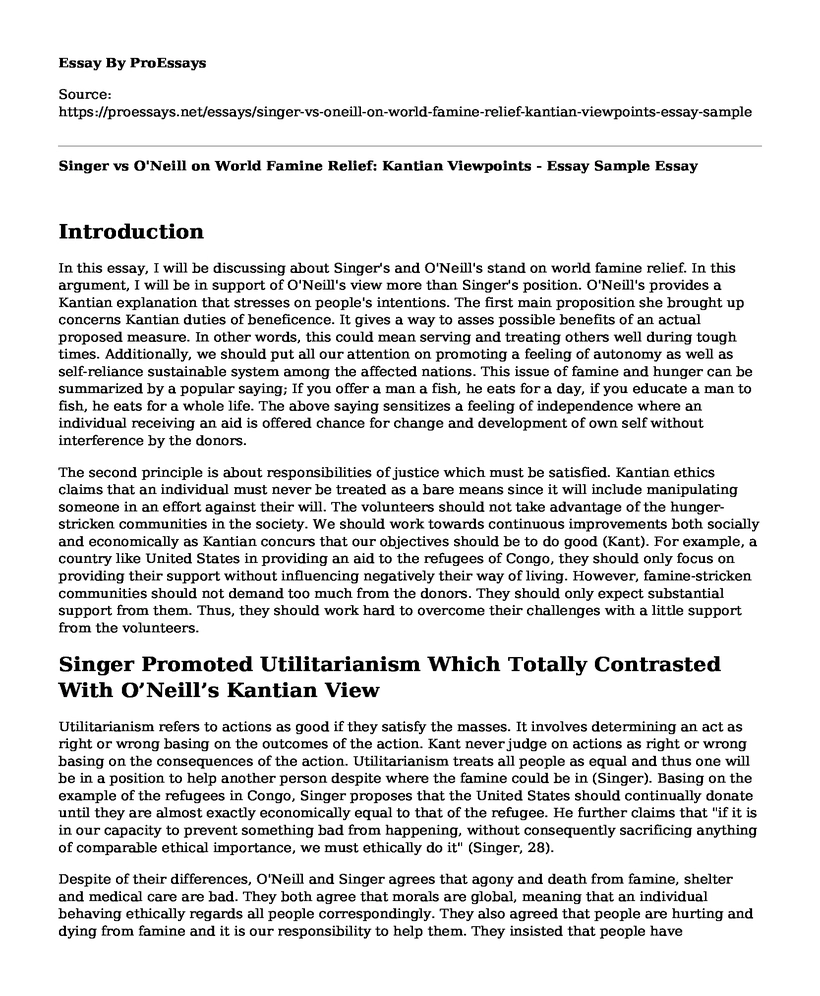Introduction
In this essay, I will be discussing about Singer's and O'Neill's stand on world famine relief. In this argument, I will be in support of O'Neill's view more than Singer's position. O'Neill's provides a Kantian explanation that stresses on people's intentions. The first main proposition she brought up concerns Kantian duties of beneficence. It gives a way to asses possible benefits of an actual proposed measure. In other words, this could mean serving and treating others well during tough times. Additionally, we should put all our attention on promoting a feeling of autonomy as well as self-reliance sustainable system among the affected nations. This issue of famine and hunger can be summarized by a popular saying; If you offer a man a fish, he eats for a day, if you educate a man to fish, he eats for a whole life. The above saying sensitizes a feeling of independence where an individual receiving an aid is offered chance for change and development of own self without interference by the donors.
The second principle is about responsibilities of justice which must be satisfied. Kantian ethics claims that an individual must never be treated as a bare means since it will include manipulating someone in an effort against their will. The volunteers should not take advantage of the hunger-stricken communities in the society. We should work towards continuous improvements both socially and economically as Kantian concurs that our objectives should be to do good (Kant). For example, a country like United States in providing an aid to the refugees of Congo, they should only focus on providing their support without influencing negatively their way of living. However, famine-stricken communities should not demand too much from the donors. They should only expect substantial support from them. Thus, they should work hard to overcome their challenges with a little support from the volunteers.
Singer Promoted Utilitarianism Which Totally Contrasted With O’Neill’s Kantian View
Utilitarianism refers to actions as good if they satisfy the masses. It involves determining an act as right or wrong basing on the outcomes of the action. Kant never judge on actions as right or wrong basing on the consequences of the action. Utilitarianism treats all people as equal and thus one will be in a position to help another person despite where the famine could be in (Singer). Basing on the example of the refugees in Congo, Singer proposes that the United States should continually donate until they are almost exactly economically equal to that of the refugee. He further claims that "if it is in our capacity to prevent something bad from happening, without consequently sacrificing anything of comparable ethical importance, we must ethically do it" (Singer, 28).
Despite of their differences, O'Neill and Singer agrees that agony and death from famine, shelter and medical care are bad. They both agree that morals are global, meaning that an individual behaving ethically regards all people correspondingly. They also agreed that people are hurting and dying from famine and it is our responsibility to help them. They insisted that people have compulsory roles in assisting other people in need. The difference comes in on the responsibilities where O'Neill's view responsibilities as an action which is right or wrong without basing on the consequences while Singer views responsibilities as an action which is right or wrong basing on the outcomes of the action. Therefore, O'Neill's argument is superior to Singer's since their view needs people to maintain their belief of autonomy in their minds. Autonomy enhances an environment of self-improvement and self-reliance rather than an environment of dependency (Jeffery, 37-64).
Works Cited
Jeffery, Renee. Reason and emotion in international ethics. Cambridge University Press, 2014.
Singer, Peter. "Famine, affluence and morality." Applied Ethics: A Multicultural Approach (2008): 149.
Kant, Immanuel. "Groundwork of the Metaphysics of Morals." Trans. Gregor, Mary. From Ethics: History, Theory, and Contemporary Issues (6th Ed.). Ed. Cahn, Steven M., and Markie, Peter. New York, Oxford University Press, 2015. Print.
Cite this page
Singer vs O'Neill on World Famine Relief: Kantian Viewpoints - Essay Sample. (2023, Apr 24). Retrieved from https://proessays.net/essays/singer-vs-oneill-on-world-famine-relief-kantian-viewpoints-essay-sample
If you are the original author of this essay and no longer wish to have it published on the ProEssays website, please click below to request its removal:
- Research Paper on Immigration and Europe
- Computer Ethics in the Workplace Essay
- Biopsychosocial Intervention Paper Example
- Argumentative Essay on Kant's Conception of Duty
- Texas Poor Deserve Our Attention: Allocate Resources, Provide Scholarships - Essay Sample
- Stereotypes and Poverty: Examining the Impact on Minorities - Essay Sample
- Bureaucracy in Kafka's Novel - Book Review Sample







